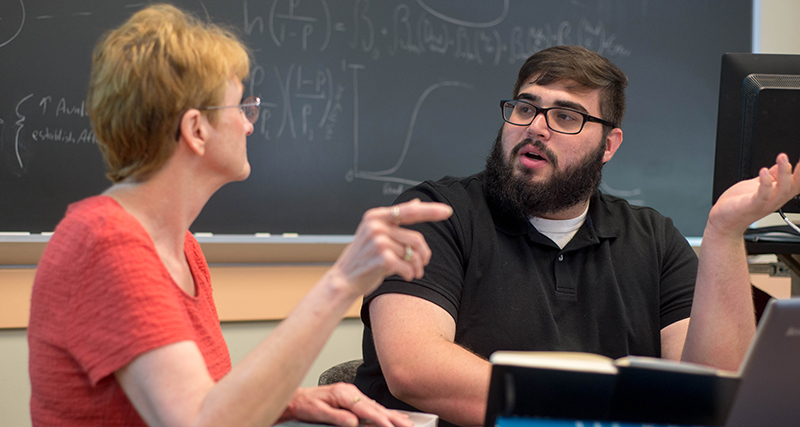When Your Health Is on the Line, Are You Making Rational Choices?
A family crisis inspired Michael Silverstein '18 to research how patients weigh the pros and cons of treatment—and what he found may surprise you.By: Meghan Kita Thursday, September 21, 2017 08:00 AM
 Michael Silverstein '18 discusses his summer research with psychology professor Laura Edelman. Photo by Rebecca Rohn.
Michael Silverstein '18 discusses his summer research with psychology professor Laura Edelman. Photo by Rebecca Rohn.This past year, Michael Silverstein '18 faced a tough situation: His father had a polyp in his colon that doctors feared was precancerous. As his family awaited test results, his father began weighing the treatment options he could pursue if the news was bad. Thankfully, it wasn’t—but the ordeal got Michael, a psychology major, thinking about the fraught process of making a decision when your own health is on the line.
“There’s a lot of literature on doctors’ decision making, but not a lot on patients’,” Michael says. “I got really interested in people’s willingness to undergo treatment.”
Michael had planned to do summer research regardless—he hopes to pursue his Ph.D. after graduation—and this experience inspired his topic: how individuals make medical decisions. With help from his academic advisor, Jeff Rudski, professor and chair of the psychology department, and his summer research advisor, Laura Edelman, professor of psychology, he designed an experiment.
The project looked at subjects’ willingness to take corticosteroids, a class of drug meant to suppress inflammation that, like most drugs, may cause unpleasant side effects. Michael varied the amount of background information subjects received on the drug, then either shared with them a positive anecdote about the drug’s effects, a negative one or no anecdote at all. Subjects then were given results-related “base rates:” One set painted the drug’s effects in a positive light, while the other skewed more negative. The subjects who heard the positive anecdote trusted it more than the negative base rates, while those who heard the negative anecdote were more likely to also trust the negative base rates.
“The anecdotal evidence represented one person and thus one data point, while the base rate information represented, as far as the participants knew, 298 people,” Michael says. “It is interesting how one data point, when given as a story, can change how much people view the other data's meaning and incorporate it into their decisions.”
Research like Michael’s helps us learn how to help people become better consumers of medical information, Edelman says. “When you’re watching TV and an ad comes on with a pretty, happy person saying, ‘I had this horrible thing and now I’m all better’—that has a huge impact on decision making,” she says.
Plus, every choice a person can make about their health has benefits and drawbacks, and whether something is considered good or bad for you can change from source to source and week to week. “Medical decision making is very complex but very important to understand because people are making decisions that are going to have huge impacts on their lives,” she adds.
Michael will continue related research for his senior thesis as he begins applying to Ph.D. programs. “I can have conversations with professionals in the field about factors that affect medical decision making, and it’s really useful for the interview process I’m going to have to go through,” Michael says. “Because Muhlenberg is solely undergrad, it gives undergraduates the opportunity to do research that grad students would be doing at larger institutions. You can’t put a price tag on that experience.”
